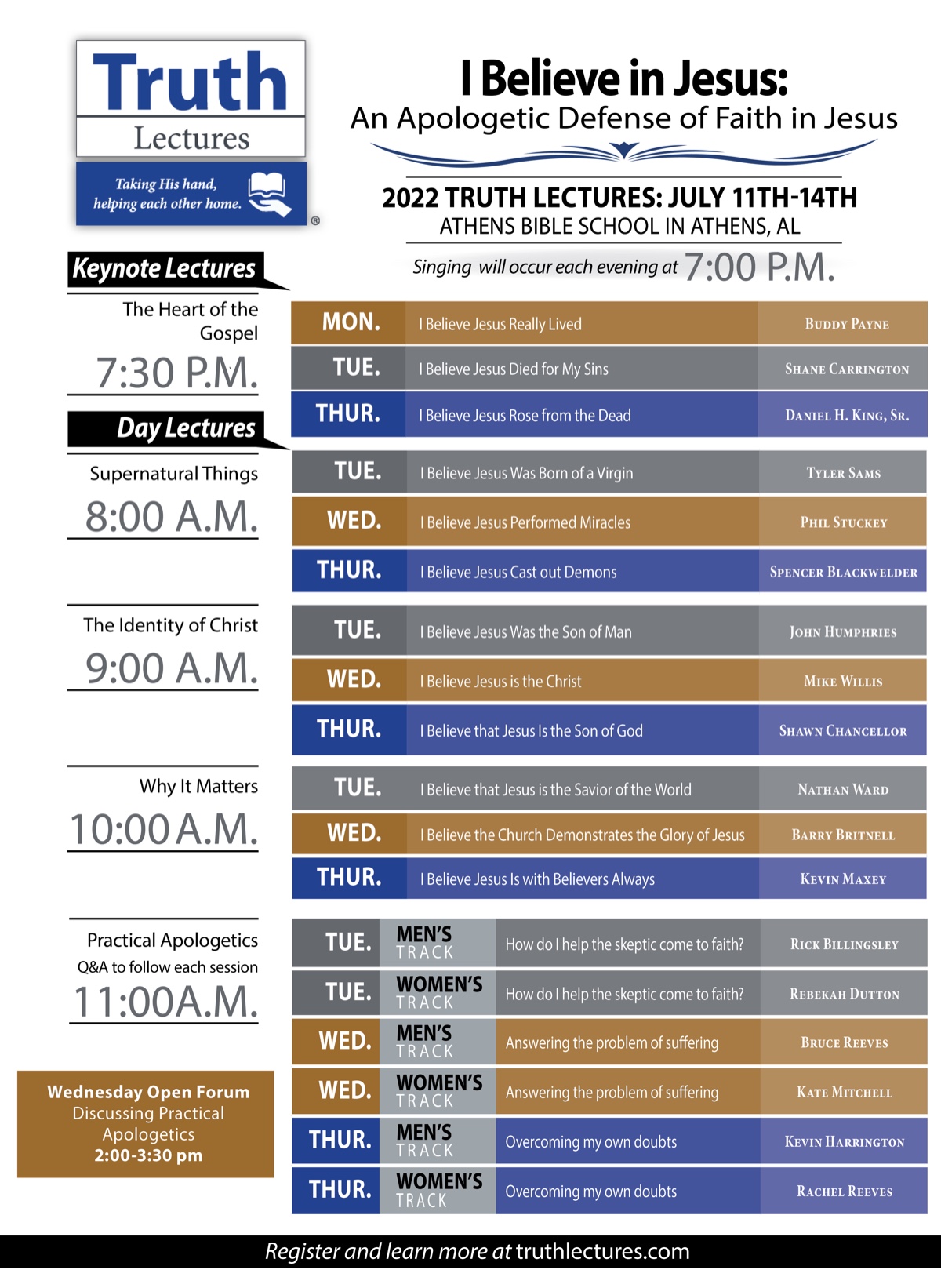by John Humphries
Synopsis: Love for God and His truth, as well as love for people, must never be forgotten or left behind when one rises to stand before an assembly of people to preach the word.
In one sense, “there is nothing new under the sun” (Eccl. 1:9). We may call various sins by different names, but all human sin is still basically the “lust of the flesh, the lust of the eyes, and the pride of life” (1 John 2:15-17). Yet there will be moral hiccups in society as “evil men and imposters will grow worse and worse, deceiving and being deceived” (2 Tim. 3:13). Certain selected sins may become more and more openly accepted, practiced, and defended (even by laws). This societal moral plunge is promoted by a wicked people “who know not God” (1 Thess. 4:5). In view of this, the charge of Paul to the evangelist is to “preach the word”!
Consider the context of 2 Timothy 4:1-5. In the beginning of chapter 3, Paul warns that “perilous times will come” upon the world. A long list follows of various sins that involve attitudes and actions that violate the word of God. These sins include overt immorality and some can lead to violence. There are sins involving hypocritical religionists and their deceived followers. Obviously, the devil is having a heyday among the unregenerate of our day (2 Cor. 4:3-4; 1 John 5:19; 2 Tim. 2:26).
Paul reveals that evil people can become more and more deeply involved in their sinful ways as they seek and invent “many schemes” to practice unrighteousness and ungodliness while they resist and attack the truth of God (Eccl. 7:29; Jer. 4:22; Rom. 1:18; 2 Tim. 3:8, 13). The Scriptures clearly teach that God’s people are amid a spiritual “war against the soul” (1 Pet. 2:11; Eph. 6:10-13; 2 Tim. 2:3).
Timothy is reminded that he has the teaching and example of the apostle Paul in dealing with adversity faced in the spiritual battles with Satan and unregenerate people (2 Tim. 3:10-14; Phil. 4:9; 1 Cor. 11:1; cf. 1 Pet. 2:21-23). Timothy’s mother and grandmother had taught him the word of God from childhood (2 Tim. 1:5; 3:15). The inspiration and complete adequacy of Scripture is declared in verses 16 and 17 of this chapter. So, what do we see in chapter 3? The world is lost in sin and many will resist (some with violence) the preaching of the word. There are worthy examples of the faithful who will stand for the truth. The needful spiritual preparation to preach the word has been met (cf. 2 Tim. 2:2-3). The truth has been fully revealed so that we have the “faith which was once for all delivered” (Jude 3; 2 Pet. 1:3). Therefore, Timothy, and all teachers of the word of God, will now receive the great charge of 2 Tim. 4:1-5.
I charge you therefore before God and the Lord Jesus Christ, who will judge the living and the dead at His appearing and His kingdom: Preach the word! Be ready in season and out of season. Convince, rebuke, exhort, with all longsuffering and teaching. For the time will come when they will not endure sound doctrine, but according to their own desires, because they have itching ears, they will heap up for themselves teachers; and they will turn their ears away from the truth, and be turned aside to fables. But you be watchful in all things, endure afflictions, do the work of an evangelist, fulfill your ministry (2 Tim. 4:1-5).
Note that this charge is under the authority of “God and the Lord Jesus Christ,” which takes this responsibility to the highest order. No one has greater authority than our Father and the Lord Jesus! This means, among other things, that the evangelist takes his marching orders, concerning preaching, from heaven and not from men. Now folks can ask the evangelist to preach on certain topics and teach what the word of God reveals on that subject. This is well and good. Yet, no man, or group of men, has the authority to forbid the evangelist from preaching the word of God on any Bible related subject. The evangelist is given divine orders to “preach the word,” meaning the “whole council of God,” and to “keep back nothing that is helpful” for the people, in order that he may be “free from the blood of all men” (Acts 20:20, 26-27; cf. Ezek. 3:16-21). Certainly, we are not defending any preacher or teacher who violates the other Scriptures that emphasize “speaking the truth in love,” etc. (Eph. 4:1-3, 15; 2 Tim. 2:24-26). Preach the word in a responsible way!
Divine judgment is coming when all will give an account before the Lord (Rom. 14:10-12; 2 Cor. 5:10; Matt. 25:31-46). Preach the word of God in order to save as many precious souls as possible (1 Cor. 15:1-2). The evangelist is to be “ready” to preach what is needed, to whom it is needed, and when it is needed. There is a “season” of readiness to accept the truth, but there is also an “out of season,” when men will resist the truth, having closed their ears. The charge is to “preach the word” whether people love the truth or whether they love their error more.
“Convince, rebuke, exhort” suggests that preaching seeks to persuade people who are guilty of sin and obviously need to repent and get their life in order before the Lord. Sin must be rebuked in no uncertain terms and condemned as contrary to the will of God. Also, penitent sinners must be exhorted and encouraged to remain close to the Lord and to serve Him faithfully. All of this preaching of sound doctrine must be done with long-suffering and patience. Love for God and His truth and love for people must never be forgotten when one rises to stand before an assembly of people to preach the word. The faithful evangelist must guard against becoming discouraged, impatient, or cynical, and/or insulting in the pulpit. The pulpit is not to become an opportunity to “get someone told,” or to “get back at” someone. This is demeaning the dignity of the pulpit and the high calling of preaching the word.
Sadly, there will be “factions” among the brethren, and some will not “love the truth” as they “depart from the faith” (1 Cor. 11:29; 2 Thess. 2:10; 1 Tim. 4:1-2). Rejecting sound doctrine, they seek false teachers who will scratch their itching ears by telling them what they want to hear (2 Pet. 2:1-3; Acts 20:29-30). This means that the evangelist must be watchful and aware of the spiritual dangers and pitfalls that endanger the church of the Lord. Whenever error is detected as launching an attack against the truth, the faithful evangelist is to arise and, “preach the word,” exposing the false doctrine.
It is certainly needful to always teach the truth when one is preaching or teaching a Bible class. One may do this for weeks and years while the brethren are being carried away with some error. This is made possible because the elders, teachers, and evangelist either ignore, or are blissfully ignorant of the devil’s attack upon truth in the local congregation.
Martin Luther said it well:
If I profess, with the loudest voice and the clearest exposition, every portion of the truth of God except precisely that little point which the world and the devil are at that moment attacking, I am not confessing Christ, however boldly I may be professing Christianity. Where the battle rages, the loyalty of the soldier is proved; and to be steady on all the battle-field besides is mere flight and disgrace to him if he flinches at that one point.
There are times when the truth has been preached in love to brethren who will not accept it. They not only will not listen, but will give the preacher a hard time. They engage in constant quibbling and being obnoxious in Bible classes that the evangelist is teaching. Some give him a quick insult or put down as they leave the building after dismissal of the service. Some succeed in getting the brethren to ask the preacher to go elsewhere (fire him). It does not happen very often in the US, but some evangelists have been physically attacked because of teaching the truth. Paul and the brethren (and some in parts of the world today) were not only insulted, ridiculed, and misrepresented, but were often physically assaulted. Nevertheless, Paul tells Timothy (and all evangelists) to “endure” whatever the devil and evil men bring against them and to not give up. The evangelist is to “do the work” and faithfully “preach the word” until the Lord calls him home! This will “fulfill” his responsibility.
Paul speaks of the wonderful reward that awaits the faithful proclaimer of God’s word:
For I am already being poured out as a drink offering, and the time of my departure is at hand. I have fought the good fight, I have finished the race, I have kept the faith. Finally, there is laid up for me the crown of righteousness, which the Lord, the righteous judge, will give to me on that day, and not to me only but also to all who have loved His appearing (2 Tim. 4:6-9).
Paul knew that his time upon this earth was nearly up. Still, he proclaims his victory in the battle for truth (Phil. 4:13; Rom. 8:31-39; Rev. 14:13). In the ebb and flow of the spiritual conflict Paul endured, he not only faithfully “preached the faith,” but as a true soldier of the Lord, “kept the faith” until the end (Gal. 1:23; 2 Tim. 4:7; Rev. 2:10).
May all who “preach the word” have this same glorious anticipation and expectation when the blessed Lord calls us home!



